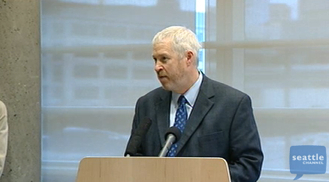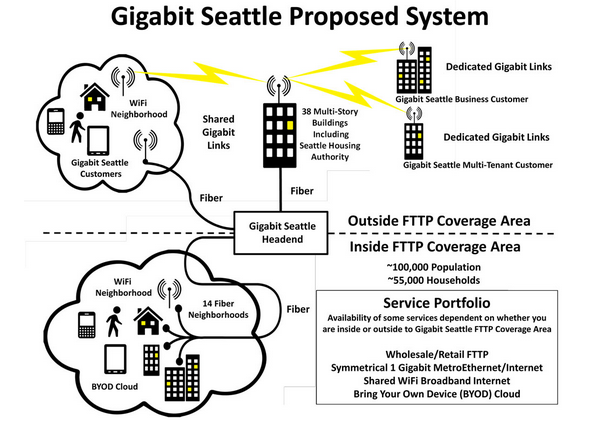
A year ago this week, Gigabit Squared, a “digital economic development” company operating out of Cincinnati, Ohio, announced a deal with Seattle officials to bring ultra high-speed Internet service to homes and businesses here — taking advantage of unused capacity in the city’s 500 miles of fiber-optic cabling.

Mayor Mike McGinn, gearing up for his re-election campaign at the time, announced the agreement alongside University of Washington and Gigabit Squared officials at a news conference — seeking to fulfill his original 2009 campaign promise of bringing high-speed Internet to people across the city.
This week, preparing to leave office after coming up short in his re-election bid, McGinn said in an interview with GeekWire that the Gigabit Seattle project has been delayed due to financing problems, and acknowledged that he’s concerned it ultimately might not come to fruition.
So what happened? Interviews this week with people familiar with the project make it clear that the financing was left largely up in the air, even as Gigabit Squared’s Mark Ansboury touted Seattle as one of the first cities to take part in the company’s $200 million broadband program.
In reality, that funding was not money in the bank, but rather a plan by the company to raise money for fiber projects across the country.
“When you dug into what Ansboury was saying, there wasn’t any money there, and there wasn’t any clear path to the money other than this general notion that if you got enough people moving in the same direction, money would show up,” said veteran broadband industry consultant Steve Blum, president of Tellus Venture Associates, who has cast a critical eye on the Gigabit Seattle plan in a series of posts on his blog.

Blum last year compared the Gigabit Seattle financing vehicle to a concept car.
“That’s not the way you build broadband systems,” he said via phone this week. “That’s not the way you finance broadband systems. … You need something more than good feelings, and they didn’t have that.”
Contacted by GeekWire this week, a Gigabit Squared representative declined to make executives available to comment on the status of the project or McGinn’s concerns about its future. The toll-free number on Gigabit Squared’s website has been “temporarily disabled,” according to an automated message.
Ansboury responded to a voice mail from GeekWire this morning with a text message referring our inquiry to Chris Vogt, whom he identified as the new president of Gigabit Squared. Ansboury said he is now managing director and hasn’t been president for four months. We’ve now left a voice mail with Vogt, as well.
[Update, 11:15 a.m.: Gigabit Squared just issued this statement in response to our inquiries: “Gigabit Squared has completed several rounds of investment financing and is currently executing projects in Illinois and Florida with a combination of public and private funding. Gigabit Squared appreciates Mayor McGinn’s passion for, and support of, the FTTH project in Seattle. We look forward to a dialogue regarding project possibilities with Mayor-elect Murray and his staff.”]
Speaking with KUOW radio over the summer, Ansboury expressed confidence that the initial funding could be raised. “Our goal right now is $20 million,” he told KUOW. “We’re part way there and we’ll most likely finish that off within two months and wrap that up.”
Gigabit Squared was also planning to “soon” roll out a signup process for customers, involving an unspecified deposit, which has yet to be announced by the company.
At the time, the company had announced the initial pricing structure for its Internet service, offering gigabit speeds for around the same price per month as what Comcast charges for much slower 50 Mbps download/10 Mbps upload. The company was targeting an early 2014 rollout for two of the 14 “demonstration” areas — University District and Capitol Hill —with the rest slated to get access to Gigabit’s network by the end of 2014.
Funding crunch puts brakes on project
McGinn told GeekWire this week that the schedule has since been delayed because of the financing problems. If the project doesn’t go forward with Gigabit Squared, he said he would like to see the city explore the idea of a municipally owned fiber utility.
[SEE RELATED Q&A: Mayor McGinn: Seattle should create a public fiber Internet utility if Gigabit Squared fails]
The outgoing mayor made the Gigabit Seattle project a campaign issue by highlighting campaign contributions from Comcast to state Sen. Ed Murray, now the mayor-elect. In the interview, he defended that strategy, saying it spoke to a larger issue with incumbent broadband providers.

“The incumbent providers of internet service are not upgrading their systems in any meaningful way,” McGinn said. “That means cities like Seattle are falling behind and will fall behind other places in the globe if we don’t upgrade service.”
But that’s not an accurate portrayal, said John van Oppen, the co-founder of Spectrum Networks. The company this year was acquired by WaveDivision Holdings along with its subsidiary CondoInternet, and it’s building out its own gigabit service in the region by focusing on multi-family residential projects, most recently in Seattle’s Ballard neighborhood.
“To say nobody is investing anything is just silly,” said van Oppen. “We all, collectively as an industry, want to keep customers and we invest large amounts of money to offer additional services and to accommodate additional usage over time.”
Van Oppen explained, “We fight two battles. One, people want faster speeds. Two, which is kind of hidden, is the usage of what people have goes up every month. We have to upgrade to keep the speeds up and match the higher usage. The service would stay the same if we didn’t put capital in. We have to keep upgrading to offer faster and faster services.”
At the same time, he said Gigabit Squared faces major challenges financing the project. “This is something that is very hard to raise money for, especially if you haven’t done it before. It’s not a trivial amount of money that you would need, and it’s especially difficult not having a proven business model.”
Inside the city, there have been increasing concerns about Gigabit Squared’s ability to pull off a project on this scale.
Although the city announced last year that it had reached an initial agreement with Gigabit Squared, many of the details were left to be worked out. They hinted at this in the news release at the time: “The City, the University and Gigabit Squared have signed a Memorandum of Understanding and a Letter of Intent that allows Gigabit Squared to begin raising the capital needed to conduct engineering work and to build out the demonstration fiber network.”
For some people in the city, one red flag came when the company declined an offer of help from Stan Wu, a longtime Seattle city engineer who played a key role in building out the city’s existing fiber network.
Gigabit Squared’s broadband pedigree
Gigabit Squared’s leaders do have notable resumes, with experience building community broadband projects in places including Cleveland, Ohio; Chattanooga, Tenn.; and Jackson, Miss.; among other cities. Gigabit Squared’s $200 million “Gigabit Neighborhood Gateway Program” was created in partnership with Gig.U, a group of research universities led by Blair Levin, a former top broadband official with the Federal Communications.
And to help get the Seattle project off the ground, the company also brought in respected computing industry veteran Armando Stettner, famous in computer science circles for creating the original UNIX “Live Free or Die” license plate. Stettner couldn’t be reached for comment before press time.
Ed Lazowska, the University of Washington computer science professor who spoke at the Gigabit Seattle announcement, said this week that Stettner has been doing good work to bring the project to fruition. But Lazowska, who is not directly involved in the project, said it still faces major hurdles.
“Armando is strongly committed to trying to see this project through,” Lazowska said via email this week. “But in addition to raising the money for the rollout, there’s a question of whether it can be financially viable. For political reasons, the City’s specification for the initial stages did not focus entirely on areas of the City where there were clearly customers willing to pay.”
Another challenge is that any investors in the project will need to take a long-term view — with financial returns possibly not coming for many years, given the scale of the build-out, and the likelihood that the incumbent providers would compete aggressively on price.
Whether or not Gigabit Squared can pull off the project, the fundamental concept of leveraging the city’s existing fiber network is a good one, Lazowska said. He said “the idea of the city making its fiber available to others as an alternative to Comcast and CenturyLink is *excellent*. There shouldn’t be any debate about that. We have *terrible* Internet service in Seattle — high price, low bandwidth, limited choices.”
One way or another, this will be a major issue for incoming mayor Murray to address.
McGinn cited Google Fiber as an example of what’s at stake. “The kids are moving to Kansas City right now because they want to get that fiber,” he said. “I don’t want to say anything bad about Kansas City, but we want the kids to come here. We want the entrepreneurs who want that high speed to come here.”
Editor’s note: Wave Broadband is a GeekWire annual sponsor.



